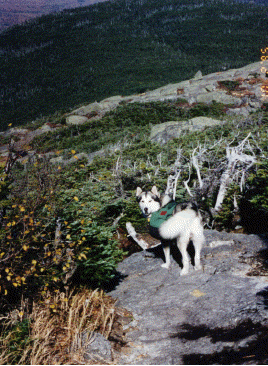|
So you think that a malamute is the perfect dog for you. Sure, they certainly are beautiful, but there is a lot more to them than that. Read below to find out a bit more about malamutes. You may discover that they really aren't your dream dog (or you may love them even more!).

- Malamutes are a working dog. That means that you will need to exercise them on a daily basis. You can teach them to pull a sled or a cart (and that is truly fun) but you can also hike with them (they can carry their own gear in a special dog backpack), jog, go for long walks or let them run in a FENCED IN area. If you do not find something to do with them daily, they will find many ways to keep themselves from being bored. This could include excating the Grand Canyon in your backyard or maybe using various things in your house (how about that new pair of sneakers or the dining room set you just bought?) as chew toys. So, if you get a mal, plan on some daily activity to keep your dog physically and emotionally in shape.
- Malamutes shed, and shed and shed. But don't wory, this only happens a couple of times a year.
- Malamutes are rather large. An average male is about 85 pounds and an average female is 75 pounds. That is a lot of dog if not trained properly.
- Malamutes are independent. If you would like a dog whose only question when asked to jump is How High?, look elsewhere. Malamutes have a mind of their own and frequently put it to use!
- Malamutes can be same sex dog aggressive. That means male may not like other male dogs and females may not like other female dogs. You will need to socialize your malamute puppy with both dogs (and people) from a very young age and continue to do so as the dog grows older.
- Malamutes love people. They are not "one person" dogs and make wonderful family pets. However, they do need to be worked with from a very young age. Obedience training should start early. And all family members, both children and adults, should learn the proper way to treat and handle a dog.
- Malamutes make lousy watchdogs. They are generally too friendly.
 Malamutes can live with cats. It is best to introduce them to cats while they are still puppies and to never allow them to be rough with the cat. But remember, some dogs have a high prey drive so that even if you can trust them with your cat, you may not be able to trust them with other cats outside. (By the way, this is true of many breeds of dogs.)
Malamutes can live with cats. It is best to introduce them to cats while they are still puppies and to never allow them to be rough with the cat. But remember, some dogs have a high prey drive so that even if you can trust them with your cat, you may not be able to trust them with other cats outside. (By the way, this is true of many breeds of dogs.)
- Malamutes are generally clean dogs.
- Malamutes are clever. They are very good at solving problems and at not always doing what you would like them to do.
- Malamutes are versatile. My dogs and I do pet therapy with both children and adults. We also compete in obedience trials, pack, sled, cart and have tried a little tracking. We patience and training, you and your dog can participate in many activites.
- Once you fall in love with a malamute, you are hooked.
|
Before getting any companion dog think:
* Do you have the time to devote to a companion animal? Dogs require a lot of attention. Are you ready to give up some of your 'free time' to your dog/puppy?
* Do you have the money to spend on a pet? Besides food, there are vaccinations, the cost of spaying/neutering, pet supplies (crates, toys, combs, brushes, nail clippers, etc.) and any emergencies that come up. This can all add up quickly.
* Are you getting a puppy to teach your child responsiblitiy? Rethink this. A puppy is a family pet and an adult's responsibility to care for.
* Are you ready to take on the responsibility of a pet for its entire life (12 years or more) or is this a whim?
* Do you have adequate housing? If you live in an apartment, does your landlord allow dogs? What if you move? These are all important considerations (remember, a dog can live 12 years or more, so think long term).

* All dogs need training. Do you have the time and patience it will take? Remember, even Lassie was once a puppy with no manners!
* Do you travel a lot? If so, now may not be a good time to get a dog. While you are away your dog will not only miss you terribly but will you will also have to pay the cost for a kennel or dog sitter.
* Does everyone in your family want a dog? If so, does everyone agree on the breed? It is important that all family members are in on the decision as to whether or not to get a dog and the breed selected.
|

 Selecting a Breeder | Litter Information | Pet Therapy | Home | E-Mail Me |
Selecting a Breeder | Litter Information | Pet Therapy | Home | E-Mail Me |

 Malamutes can live with cats. It is best to introduce them to cats while they are still puppies and to never allow them to be rough with the cat. But remember, some dogs have a high prey drive so that even if you can trust them with your cat, you may not be able to trust them with other cats outside. (By the way, this is true of many breeds of dogs.)
Malamutes can live with cats. It is best to introduce them to cats while they are still puppies and to never allow them to be rough with the cat. But remember, some dogs have a high prey drive so that even if you can trust them with your cat, you may not be able to trust them with other cats outside. (By the way, this is true of many breeds of dogs.)